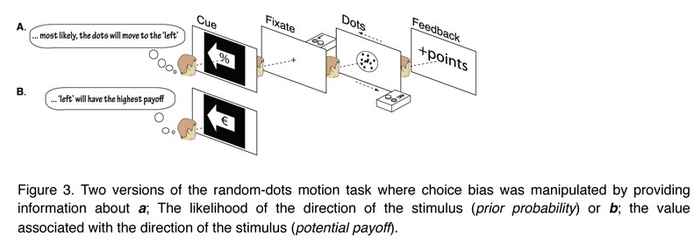Brain's decision network sensitive to prior knowledge
21 February 2012

Research conducted by neuroscientists at the University of Amsterdam (UvA) in conjunction with a fellow researcher from Ohio State University (USA) has revealed that the frontoparietal network in the brain (an area used when making decisions) is involved in the processing of prior knowledge. The study provides a more in-depth understanding of the manner in which prior knowledge influences our decision-making process. The findings appeared in the Journal of Neuroscience on 15 Feburary 2012.
When people make decisions, they are often guided by knowledge they already have on possible alternatives. This prior knowledge increases the likelihood of making the correct or most beneficial decision faster and more often. Neuroscientist Martijn Mulder and his fellow researchers examined how two different types of prior knowledge are processed in the brain: knowledge of which alternative is most likely, and knowledge of which alternative results in the greatest benefit.
Using a mathematical model, the researchers demonstrated that in both versions of this decision-making task the brain prepares itself well in advance for making either the correct or the most beneficial decision. Prior knowledge resulted in activity in the frontoparietal network of the brain, a network that is intensely involved in the processing of information during the decision-making process. With the study, the researchers have shown not only how the brain processes prior knowledge, but also that similar neural processes form the basis for various types of prior knowledge.
Cloud of dots
Test subjects were asked to perform a task, in which they had to make simple decisions in an MRI scanner. The participants were shown a cloud of moving dots on a screen, and had to quickly decide whether the dots were moving to the left or to the right. The researchers produced two versions of the task: in one version the test subjects were told in advance which direction the dots would most probably be moving in; in the other version, they were told which direction would yield the highest reward.
Brain and Cognition Research Priority Area
The study was conducted as part of the Brain and Cognition research priority area. Cognition is a broad concept which, in addition to perception, comprises thought and action as well as emotion, consciousness and movement. The Brain and Cognition research priority area examines how the brain provides us with these abilities. The UvA has 14 research priority areas, which represent the very best that the University has to offer and occupy a leading international position.
Publication details
M.J. Mulder, E.J. Wagenmakers, R. Ratcliff, W. Boekel, and B.U. Forstmann. ‘Bias in the brain: a diffusion model analysis of prior probability and potential payoff’, in Journal of Neuroscience, 15 February 2011.